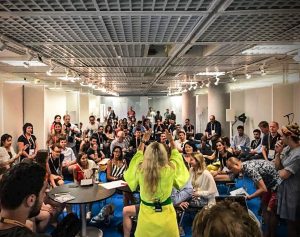Soon after the sunset, a beautiful twilight by the river of Kinabatangan with view of Kota Kinabalu Mountain. We have just come back from the “hunt” for Proboscis monkeys.
They are only present in Borneo, so everybody really wants to see them. They are very special. In every way.
First of all, they have gigantic noses (for reasons unknown the Malaysian people say they “have the Dutchman’s nose”). Males have particularly large noses – so they are the ones we are looking for amongst the trees. Noses are supposed to attract beautiful ladies (who else?!), but also… in case of danger, they have the purpose of warning others – through creating special vibrations (that nose is really big).
Proboscis monkeys live in harems – one male and usually 8-15, up to 20 females. This is why they are affectionately called playboys. This characteristic must be the subject of humans’ jealousy, as people recognise it as something special – which accidentally is not true, because macaques (which are VERY common) also live in harems (even though they don’t have Dutch noses).
For me more interesting fact than their amorous conquests was that they are the only monkeys that don’t eat bananas. To me monkeys and bananas have always been inseparable. It’s as if a child didn’t like sweets. And here we go – there are some monkeys that don’t like bananas. And not only they don’t like them – they don’t digest them, either. Literally! They feed mainly on young (with emphasis on “young”) leaves.
‘It’s good for them as they are not dependent on fruit. And there are always plenty of leaves,’ said the guide.
This of course is the least important information, although a monkey that does not eat bananas seems much weirder to me than the one with the Dutchman’s nose. Everyone has their own misfortune – what can you do …?
Monkeys don’t eat bananas, but love cucumbers instead… as well as crepes, which are especially prepared for them at their natural “zoo”, i.e. the sanctuary for the Proboscis monkeys. The local guide tells me that they are exceptionally good swimmers. Life full of pleasure, healthy food, physical activity – for those reasons the question came to my mind:
‘I wonder, does this healthy lifestyle mean that they live longer?’
‘About 9 years?’
‘Really? That’s a really short time, because orang-utans live over 30.’
‘Ah… Then maybe it’s 19 years. Something with 9.’
Everybody laughs, but I still don’t know how long these monkeys live… So I ask another guide, who tells me that he doesn’t know how long the monkeys live:
‘It doesn’t matter how long they live. What’s important is that every day of their life is a paradise.”
Suddenly there I had a snapshot of all the philosophical discussion on the meaning of life. And an attempt to lay in one sentence: what, when, for whom and to what extend is important. It has always come down to one banal statement that the most important thing is to be happy, because then it is obvious there are love, money, time.
This is why, before Christmas on Borneo, I wish you all and myself that we have a monkey life – may each day be a paradise, regardless of whether there are bananas (or other treats) of whether they are momentarily missing.




